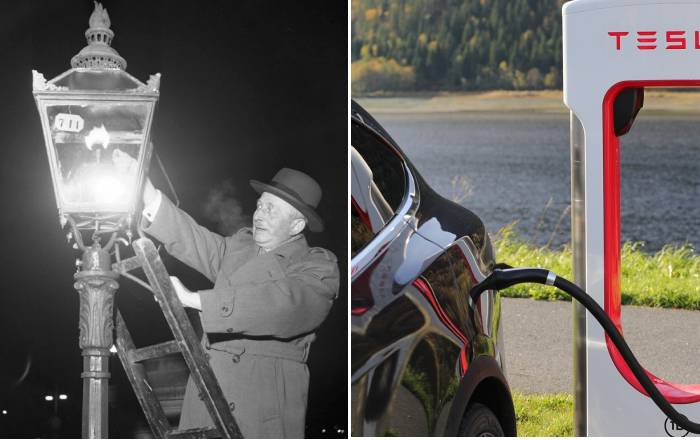
Image: Left – Public Domain | Right – Blomst
Australia’s Chief Scientist Dr. Alan Finkel has defended electric vehicles and taken on the naysayers, saying that instead of focusing on the current challenges, we should look at the potential of EVs.
In an opinion piece, Dr. Finkel has likened the current situation with electric cars to that of the introduction of electric street lighting. Gas lamps may have been more dangerous, but they were widely accepted in the late 1800’s. There was some stiff resistance to the switch to electric based on the fact that the first electric lights were more costly, they were untested at scale and unfamiliar.
“The problems were obvious, the potential was only visible to those with the courage to look,” says Dr. Finkel. “With the perspective of time, we see a failure of imagination. We forget how the arguments stacked up to our forebears.”
Another challenge for electric vehicles is the perpetuating of myths based on old information or just flat-out misinformation.
The Chief Scientist addressed recent claims by Craig “Renewable Energy Kills” Kelly1 that driving a Tesla electric car involves more emissions than a Toyota Corolla.
Says Dr. Finkel:
“The 2017 Corolla petrol sedan has emissions of 178 grams per kilometre. The much larger Tesla Model S 75 RP has lower emissions, at 168 grams per kilometre, charged on the 2017 national electricity grid (910 kg/MWh emissions).”
.. and with more renewables being added and energy generation in Australia generally cleaned up, this will decrease over time.
Regarding “range anxiety”, Dr. Finkel points out some electric cars can easily take on a journey from Canberra to Sydney on a single charge2; and as batteries and fast charging infrastructure improves, so will the distance we’ll be able to roam comfortably.
As was the case with solar power, the Chief Scientist states electric vehicle purchase costs are falling rapidly as the global automotive supply chain retools around “electric-first”.
“Vehicle manufacturers in Europe, China and the United States are committed to going electric in the next few years, and as they compete at large volumes, costs will tumble.”
Dr. Finkel believes the benefits of electric vehicles won’t flow only to a tiny minority of Australians. He thinks once more Australians experience them and see EVs being used at scale in foreign cities, we won’t look back.
On a related note, SQ blogger Ronald has previously answered the question of how many solar panels are needed to charge an electric car and shared his thoughts why electric cars will roll over the competition.
Footnotes
- Regarding some of Craig Kelly’s other claims regarding electric cars, Nigel Morris addresses these in an article on RenewEconomy. ↩
- Canberra to Sydney is around 280km. Some electric vehicles can travel far further than that already and others will soon ↩

 RSS - Posts
RSS - Posts



I recently read an article about depreciation rates for EVs being high due to the high rate of development. The EV That I can buy in a years time will be faster, better, go further, safer – and so the one I buy this year will be of little value.
The premise seems reasonable to me.
Does this work n practice?
Page me and I’ll fax you some info about it!
We have the most expensive electricity in the world with unreliable supply that in high demand days cannot keep up. Oil prices are steady to falling with unprecedented levels of supply and ICE are becoming increasingly fuel efficient.
And this guy wants lots of EV’s (which in Australia makes them a primarily coal powered vehicle) sounds more like a high priest than a legitimate scientist. Get the supply issues sorted, halve the power price, double the battery range then get back to us mister.